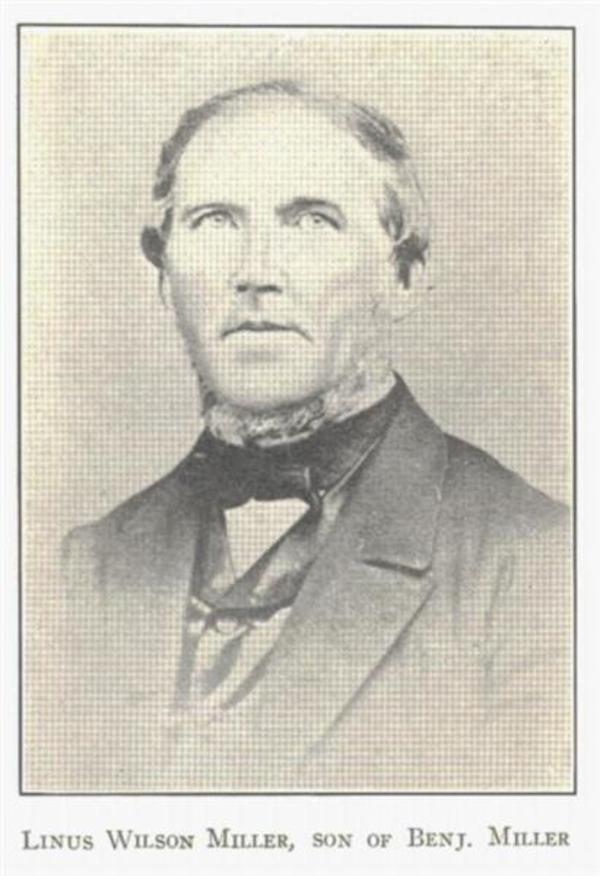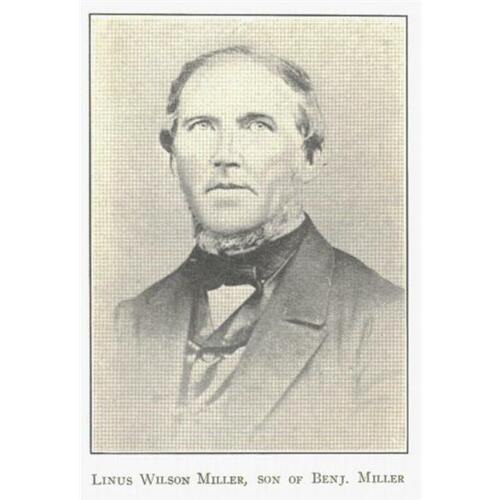
Source: Link
MILLER, LINUS WILSON, farmer and insurrectionist; b. 28 Dec. 1817 in Delanti (now Stockton), N.Y., son of Benjamin Miller, a pioneer settler in Chautauqua County, N.Y., and Laura Hamlin; d. 11 April 1880, at Jamestown, N.Y.
Linus Wilson Miller was among the Americans who strongly sympathized with the “Patriot” cause. He studied law with Judge James Mullett, and in early spring of 1838 he visited Upper Canada to verify the views he held on the situation in the colony. He returned to Canada in April as the emissary of the Canadian Refugee Relief Association in Lockport, New York, to abduct seven men who had been sentenced to die for their part in the rebellion and who were being held in the Hamilton jail. The scheme failed, as the result, Miller said, of the activities of the “Prince of Traitors, Jacob Beemer.” Miller himself narrowly escaped to the United States.
He again entered Upper Canada in June 1838, alone, as the staff officer of General Donald M’Leod in the Patriot army. Major plans for an invasion by the Patriots on 4 July had been made, and M’Leod saw these jeopardized when news came that a small party of Patriots, under Colonel James Morreau and including Beemer, was in the vicinity of the Short Hills in the Niagara peninsula. Miller was sent with orders from M’Leod that they withdraw, but they refused. The border was too closely guarded for Miller’s return to the United States, and he rejoined the raiders, but he was captured soon after. Miller and 15 others were tried at Niagara and received the death sentence, later commuted to transportation overseas. Confined in Fort Henry, they were later sent to England and were held in Newgate Prison for six months while the English Court of Queen’s Bench examined the cases. The sentences of transportation were eventually confirmed for the 16 men, despite pleas made by Lord Brougham, John Arthur Roebuck, Joseph Hume, and William Henry Seward, later a member of Abraham Lincoln’s cabinet. Miller and his fellow prisoners were placed aboard Canton along with numerous English felons, and landed at Hobart, Van Diemen’s Land (Tasmania), on 12 Jan. 1840.
For the next four years Miller was compelled to undergo the same hard labour and harsh treatment as the English felons. He was interned for some time with the other Canadian prisoners at Brown’s River Road Station; after being transferred to Lovely Banks he attempted to escape in 1840 and was sent to the maximum security prison at Port Arthur. Only in his last year of exile did his condition improve. He received his pardon following the recall in 1843 of the lieutenant governor of Van Diemen’s Land, Sir John Franklin*, and he became tutor to the family of Thomas James Lempriere, the colony’s assistant commissary. He sailed for home in September 1845 and landed in the United States 25 Jan. 1846.
Linus Miller’s account of his exile is recorded in a book he wrote and published in 1846 after his return. It is divided rather unequally between the record of his service with the Patriot force in Upper Canada, the review of his case before the English Court of Queen’s Bench, and his days of exile between 1840 and 1844. Miller provides abundant detail of penal life. His style is bitter and bombastic, and a reader might doubt his mental balance. Despite the author’s readily apparent prejudices, however, the narrative is one of the most informative of the memoirs written by men sent to Van Diemen’s Land.
Miller was married on 10 Jan. 1850 to Anne Jeanette Curtis, to whom two sons and three daughters were born. Miller engaged in farming and dairying at Delanti. He moved to Jamestown, N.Y., shortly before his death.
L. W. Miller, Notes of an exile to Van Dieman’s Land: comprising incidents of the Canadian rebellion in 1838, trial of the author in Canada, and subsequent appearance before her majesty’s Court of Queen’s Bench, in London, imprisonment in England, and transportation to Van Dieman’s Land . . . (Fredonia, N.Y., 1846). Fredonia Censor (Fredonia, N.Y.), 21 April 1880, 7 April 1897. E. C. Guillet, The lives and times of the Patriots; an account of the rebellion in Upper Canada, 1837–1838, and the Patriot agitation in the United States, 1837–1842 (Toronto, 1938). Fred Landon, An exile from Canada to Van Diemen’s Land; being the story of Elijah Woodman transported overseas for participation in the Upper Canada troubles of 1837–38 (Toronto, 1960), 178, 204–7, 212, 216, 255–56. A.W. Young, History of Chautauqua County, New York: from its first settlement to the present time (Buffalo, N.Y., 1875).
Cite This Article
Fred Landon, “MILLER, LINUS WILSON,” in Dictionary of Canadian Biography, vol. 10, University of Toronto/Université Laval, 2003–, accessed December 31, 2025, https://www.biographi.ca/en/bio/miller_linus_wilson_10E.html.
The citation above shows the format for footnotes and endnotes according to the Chicago manual of style (16th edition). Information to be used in other citation formats:
| Permalink: | https://www.biographi.ca/en/bio/miller_linus_wilson_10E.html |
| Author of Article: | Fred Landon |
| Title of Article: | MILLER, LINUS WILSON |
| Publication Name: | Dictionary of Canadian Biography, vol. 10 |
| Publisher: | University of Toronto/Université Laval |
| Year of publication: | 1972 |
| Year of revision: | 1972 |
| Access Date: | December 31, 2025 |



